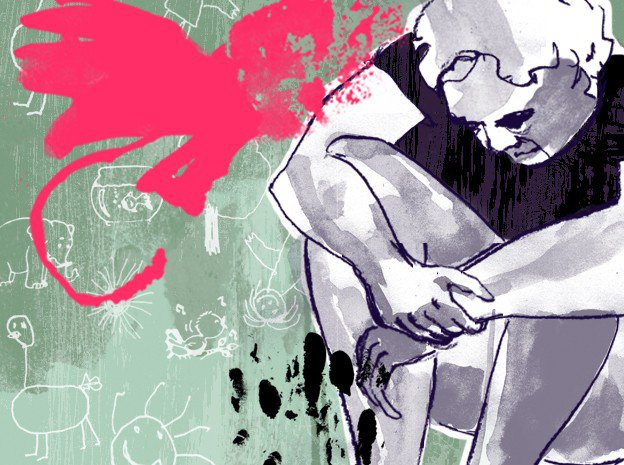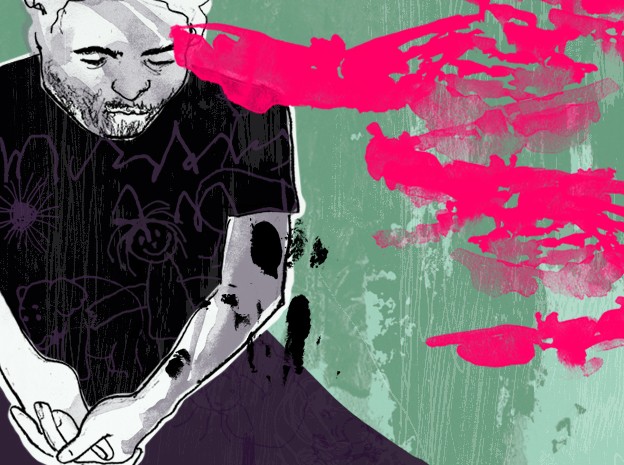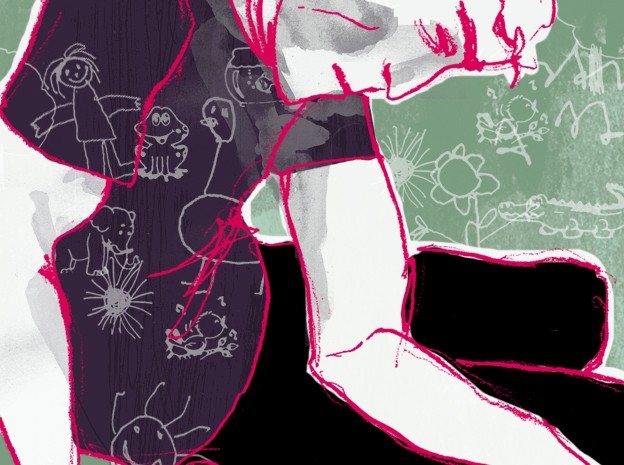Pedophile Talks About Attempts to Treat the Disease and Fear of Losing Control
Giovana Sanchez and Bruno Machado
G1, in São Paulo
[Original story in Portuguese]
 Illustration: Mariana Leme
Illustration: Mariana Leme
— How was the reaction when you told your wife?
— Wow, she was devastated. At the time, she didn’t say anything. She was speechless. I was only able to talk to her again the following week, already in jail.
— Are you religious? Did you look for help or did you already have it?
— I already had, I was evangelical. But I didn’t ask anyone for help. It’s very difficult to ask for help. If I said, "I'm a thief," it would be easier. Not a pedophile, because the pedophile is already stigmatized. He's a criminal. He is not a patient, he is a criminal.
Marcos* is 52, has two teenage children, a wife and a job. He also has guilt—the guilt of someone who committed a crime and had to go to jail before realizing they needed help. The guilt of someone who has a disease that is almost automatically associated with crime: pedophilia, the medical term for the sexual desire for children.
With his voice trembling, Marcos thanks God for having his family close to him. In his personal account obtained by G1, he talks about the fear of losing control, of "becoming a pervert." The impulse began in adolescence. "I thought it was normal for everyone." About ten years ago, Marcos started to have more internet access and everything got worse. "I became addicted to this type of website. How can I say? I turned into a visitor, started collecting [child pornography like sports] cards. I started to watch videos of sex involving kids."
Traced by the Federal Police (FP), Marcos was arrested for having child pornography on his computer. According to data from the FP provided by the organization SaferNet Brazil, from 1999 to 2013, 333 people were arrested for this crime. Just last year, there were 860 investigations and 134 arrests for possession or consumption of child pornography in Brazil.
Marcos stayed in jail for just over a year—the sentence for this crime ranges from 1 to 4 years in prison. When he was released, he looked for help. "It was very embarrassing. In the first sessions, even talking to the doctor was very difficult." Today he takes four types of medication (antidepressants in general) in addition to undergoing psychiatric monitoring. "It was very important, both the medical and the psychological treatment. I was compulsive, I watched videos compulsively, compulsively masturbated as well," he explains.
Sexual desire for children is listed in medical manuals as a subset of paraphilia—sexual preference disorders that include, for example, inability to consent to sex and partner’s humiliation. Pedophilia affects less than 1% of men and between 0.2% and 0.3% of women—making up for around 997,000 men and up to 311,000 women in Brazil. The disease is diagnosed in people age 16 and above who have frequent or intense fantasies or engage in sexual activities with children or adolescents under 13.
There is a common assumption that every child abuser is a pedophile. But according to doctors, not every pedophile is a child molester, and not every child abuser is a pedophile.
Ten years ago, Danilo Baltieri, psychiatrist and professor at the ABC Medical School studied child abusers in a São Paulo prison for his doctoral research. Of them, 20% were diagnosed as pedophiles. According to the international literature on the subject, the percentage of mental disorders among child sex offenders can range from 30% to 60%. "These 20% [that is, the population diagnosed as pedophiles] were there without treatment, without care, nothing," says Baltieri, who runs the only center that specifically treats paraphilias in Brazil.
"It's not an easily diagnosed disorder. It is difficult, it needs more than a single appointment,” he explains. "Initially, the treatment uses a specific type of group psychotherapy: cognitive-behavioral, focusing on the patient's ‘sexually diverted’ behavior.”
At ABC Medical School, Baltieri treats 20 pedophiles—19 men and 1 woman—for free. Some were arrested for child abuse or for consuming child pornography, and some have not committed crimes. "Many individuals with pedophilia do not actually do anything, they just fantasize sexually and sometimes even marry women. [...] Pedophilia is not a crime, pedophilia is a disease. The crime is the rape of the vulnerable—it is the act. Some individuals with the disease commit the act and are criminals. [...] There is a tendency to say 'pedophilia is a crime, report it.' This is total nonsense that only harms patients who need treatment," says Baltieri, who has been treating pedophiles for 15 years.
The idea that the pedophile is a sick person who needs to undergo treatment is shared by Deborah, a 29-year-old housewife from the suburbs of São Paulo. In late July, she was surprised that her nine-year-old daughter had received a Facebook friendship invitation from a young man asking her to install a temporary messaging application.
"I monitored it, I took her out of Facebook and I talked to him as if it was my daughter. And he talked. He asked if I already knew about sex, if I wanted to learn, [and told me] what he wanted to do. He would send pictures of his genitals. When I insisted that I was a child, because I had to [get him to admit to] pedophilia, he said that he had no problem with it, because he had seen all the photos and liked her [my daughter] anyway. That's when I made all the police reports and went to the Federal Police," she said in an interview with G1.
The mother discovered that the man is a 18-year-old former student of his daughter's school in Piracicaba (SP). She got in touch with his mother and arranged to meet them both. "It was a sad meeting for me. His mother was there, very desperate, unable to believe what was happening. I see the suffering of that mother, and as I am also a mother, I suffered a lot," said Deborah. "He needs treatment. Because it will not change overnight."
 Illustration: Mariana Leme
Illustration: Mariana Leme
Deviant Impulse
Group therapy is a way of sharing experiences among pedophiles. For Carlos Eduardo Teixeira, a psychologist who has been coordinating sessions with pedophiles at ABC Medical School for three years, the goals are "to make them stop in the face of risky situations, reduce sexual urgency, [...] adjust thoughts and decrease the risk of relapse." One of the techniques, for example, is to guide them to stop masturbating if the thought of children arises. Another is to leave a note beside the computer discouraging the consumption of child pornography.
The drugs prescribed are typically antidepressants, which may be associated with impulse and mood controllers. According to Baltieri, in situations where the patient does not respond to the initial treatment, the use of so-called "hormonal medications" is advisable. "This is recommended in several parts of the world for those individuals who can not reduce their sexual drive despite therapy used with other medications, and for those who want to use these drugs," he explains.
Hormone therapy is not intended to inhibit desire. According to the doctor, "the goal is not to leave the individual impotent. In all [the treatments], the expert's function is to maintain the function of the patient's sexual life. It will not suffice to impede their ability to have an erection and set them loose in society, this is not treatment. The goal is to maintain his sexual functionality [...]. The medications serve to control the highly deviated impulse and provide the opportunity for him to reshape his choices through modifying sexual fantasies."
Potential aggressors
But whether because of the stigma, guilt, lack of access to treatment or for not seeing themselves as being sick, the fact is that few pedophiles seek help. "Aid programs are still small and have no exposure due to social disapproval. It is a serious problem, because there is no dialogue with these patients," says Antonio de Padua Serafim, coordinator of the Center for the Study and Research in Forensic Psychiatry and Legal Psychology of the Hospital das Clínicas in São Paulo.
At Hospital das Clínicas, Serafim and his team treat offenders who have mental disorders. The offenders under treatment are there because of court orders. "We also offer a voluntary [therapeutic] program. Up to now, in more than ten years of work, we have received a single voluntary patient," he says. "There is still a lot of resistance [...] Many professionals are not prepared to receive this type of patient. Many professionals, whether in law, in medicine, in psychology, still understand pedophilia as shameless."
Experts argue that while treatment cannot cure pedophilia, it can help prevent crime. "It is the state's duty to offer help.You will not just prevent one child from abuse, but several," Baltieri explains.
Prevention and punishment
Although pedophilia does not exist as a crime in the criminal code, Brazil effectively criminalizes the disorder—as evident in the existence of the Pedophilia Investigative Committee in Congress and even a police station in São Paulo dedicated exclusively to the "repression of pedophilia."
The Investigative Committee investigated complaints of crimes in nine states from 2008 to 2010. The final report, signed by senator Demóstenes Torres [who lost his mandate for breach of decorum] was submitted to the public prosecutor's office and did not request indictments. The discussions, however, succeeded in changing articles from the Child and Adolescent Statute that now allow anyone caught with child pornography to be arrested. For Senator Magno Malta, president of the Committee, the only solution to the problem of child abuse is imprisonment for life. "I think the disease exists, but you also have naughtiness, shamelessness, demons. People talk about treatment, but I do not know of anyone who has been treated."
Malta does not believe that pedophiles can recover and supports life sentence. "The pedophile is compulsive, the pedophile does not stop, you can put in jail for 10, 20 years, he will leave for good behavior because there is no child there, and on the same day he will commit abuse, because they are unrecoverable," he argues.
But for the prosecutor Eduardo Roberto Alcântara Del-Campo of the São Paulo public prosecutor's office, to focus politics on punishment rather than prevention is to shoot oneself in the foot. "Brazil always goes after the consequences, when it should focus on prevention. And even worse: the consequence is only a problem when it becomes public. If there’s no explosion, the state pretends it does not exist. It will only act when we there is a situation with serious repercussions."
 Illustration: Mariana Leme
Illustration: Mariana Leme
For Marcos, going to jail was what made him to realize he needed treatment. "Prison was salvation for me." When asked if he thought that he would do something against children without help, he answered, "For sure".
"To arrest these guys is not going to solve the problem. No one is against arrest. I have said that several times. None of us are against it. We are against the lack of adequate medical and psychosocial approach so that those people can recover," argues Baltieri.
Outpatient clinics in ABC Medical School and Hospital das Clínicas in São Paulo are some of the rare examples of psychosocial care for pedophiles in Brazil. They are alternatives to the notion that pedophilia is only a police issue. For Dimitri Sales, president of the Latin American Institute for the Promotion and Defense of Human Rights, the country does not provide a framework for treating a person who sexually abuses children. "The state does not offer and also has no interest in offering [help]. It does not re-educate and it does not re-socialize. No one wants to get their hands dirty with the blood of a contemptible being."
The forensic psychologist Antônio Serafim says that "the courts still see the pedophile as a criminal, not as a sick person." According to Dimitri Sales, "Rape has a social dimension that influences the judgment. It is necessary to think beyond imprisonment, which is the criminal code’s responsibility. It is necessary to take therapeutic measures."
And what would Marcos tell other pedophiles? "Do not wait and let happen to you what happened to me. Do not wait for the worst before seeking treatment. Seek care from the doctor, the general practitioner. It takes courage to come out—which I did not have."
* The names were changed to preserve the identities of those interviewed.
Post a comment